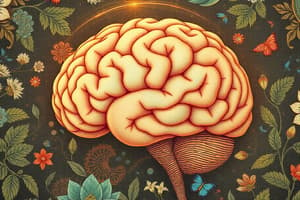Podcast
Questions and Answers
What is the main challenge associated with Fr. Schmidt's teaching style regarding working memory?
What is the main challenge associated with Fr. Schmidt's teaching style regarding working memory?
- Students lacked motivation to learn from Fr. Schmidt due to his teaching style.
- Students were unable to process information due to not receiving clear explanations.
- Students were unable to recall previous information.
- Students experienced difficulty in understanding and applying concepts. (correct)
How can negative emotions impact learning?
How can negative emotions impact learning?
- Negative emotions can lead to a decrease in motivation and effort.
- Negative emotions can create a stressful learning environment that inhibits learning.
- Negative emotions can block the formation of new neural connections.
- All of the above. (correct)
Flashcards
Working Memory
Working Memory
A cognitive system for temporarily holding information for processing.
Short-Term Memory
Short-Term Memory
The ability to retain information for a brief period, often only a few seconds.
Long-Term Memory
Long-Term Memory
The system for storing vast amounts of information for extended periods.
Negative Emotions in Learning
Negative Emotions in Learning
Signup and view all the flashcards
Neuroplasticity
Neuroplasticity
Signup and view all the flashcards
Constructivism
Constructivism
Signup and view all the flashcards
Behaviorism
Behaviorism
Signup and view all the flashcards
Pattern Recognition
Pattern Recognition
Signup and view all the flashcards
Study Notes
Memory & Learning
- Working Memory: Student, Fr. Schmidt, struggled to explain concepts, leading to incomplete understanding. Couldn't process or retain information.
- Short-Term Memory: Information held briefly, limited capacity, easily lost if not actively processed.
- Long-Term Memory: Stores information for extended periods, involves encoding and retrieval. Positive emotional associations with material can aid encoding. Limited and temporary learning can't be generally generalized.
- Sensory Memory: Brief initial registration of sensory input; information quickly lost if not processed.
- Observational Learning: Learning by observing others, crucial in skills acquisition.
- Spiegelneuronen: A specific type of neuron that might be involved in learning.
Learning Psychology (General)
- Constructivism: The learner actively constructs knowledge through internal cognitive processes. Negative perceptions hinder learning. Learning can be hindered by perceived lack of importance in subjects being learned.
- Behaviorism: Learning through conditioning, primarily focusing on observable behaviors. Negative feedback might decrease participation and engagement. Rewards and punishments can influence behavior.
- Neurobiology: Understanding the brain's role in learning and memory, using the central nervous system. Adequate sleep is needed for processing and retention.
Motivation & Emotions
- Emotions: Negative emotions hinder learning; positive emotions help in encoding.
- Stress: Lack of efficient ways to process information. Stress can impact memory and learning, along with overall ability to handle or deal with situations.
Problems in Instruction
- Difficulty grasping concepts: If instruction is not easily understood, students might struggle to process and remember the information.
- Lack of engagement: If learners struggle to find the subject interesting or relating to them, their motivation might suffer. This causes a lack of interest and can hinder learning.
- Testing and Assessment Issues: If testing relies more on memorization than application or understanding, learning might be suboptimal.
- Difficulties with Transfer: Applying prior knowledge to new situations can be challenging in some cases. Students might struggle with using acquired knowledge in new contexts.
Neurological Aspects of Learning
- Dopamine: Inadequate dopamine levels/release might impair learning, affecting neuron connections.
- Neural Connections: Importance of connections. Lack of sustained focus might lead to inadequate neuron connection development. Learning requires focused and effortful engagement.
Studying That Suits You
Use AI to generate personalized quizzes and flashcards to suit your learning preferences.



